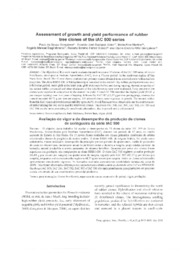Assessment of growth and yield performance of rubber tree clones of the IAC 500 series.
Assessment of growth and yield performance of rubber tree clones of the IAC 500 series.
Autoria: GONÇALVES, P. de S.; SCALOPPI JÚNIOR, E. J.; MARTINS, M. A.; MORENO, R. M. B.; BRANCO, R. B. F.; GONÇALVES, E. C. P.
Resumo: Tperformance of 15 clones of the IAC 500 series of Hevea brasiliensis, developed at Instituto Agronômico (IAC), over a 12-year period, in the northwest region of São Paulo State, Brazil. The 15 new clones evaluated are primary clones obtained from selected ortets within half-sib progenies. The clone RRIM 600, of Malaysian origin, was used as the control. Dry rubber yield performance over a four-year period, mean girth at the tenth year, girth increment before and during tapping, thermal properties of the natural rubber produced and other characters of the laticiferous system were evaluated. Forty percent of the clones were superior in comparison to the control for yield. Clone IAC 500 recorded the highest yield (66.81 g per tree per tapping) over four years of tapping, followed by IAC 502 (62.37 g per tree per tapping), whereas the control recorded 48.71 g per tree per tapping. All selected clones were vigorous in growth. The natural rubber from this IAC clones showed thermal stability up to 300ºC. No differences were observed in the thermal behavior of rubber among the IAC series and the RRIM 600 clones. The clones IAC 500, IAC 501, IAC 502, IAC 503 and IAC 506 are the more promising for small-scale plantations, due to growth and yield potential.
Ano de publicação: 2011
Tipo de publicação: Artigo de periódico
Unidade: Embrapa Instrumentação
Palavras-chave: Bark thickness, Brown bast, Espessura de casca, Hevea Brasiliensis, Produção, Secamento do painel, Vigor, Yield, Yields
Observações
1 - Por padrão são exibidas publicações dos últimos 20 anos. Para encontrar publicações mais antigas, configure o filtro ano de publicação, colocando o ano a partir do qual você deseja encontrar publicações. O filtro está na coluna da esquerda na busca acima.
2 - Para ler algumas publicações da Embrapa (apenas as que estão em formato ePub), é necessário ter, no celular ou computador, um desses softwares gratuitos. Sistemas Android: Google Play Livros; IOS: iBooks; Windows e Linux: software Calibre.
Acesse outras publicações
Acesse a Base de Dados da Pesquisa Agropecuária (BDPA) para consultar o acervo completo das bibliotecas da Embrapa.

